Democratic Progressive Party (DPP) Chairperson Tsai Ing-wen (蔡英文) said that she would develop cross-strait ties according to the constitutional framework of the Republic of China (ROC) if she wins next year’s presidential election, the party said yesterday.
“Tsai has made it very clear that she will continue to push for peaceful and stable development across the Taiwan Strait based on public opinion and the fruits accumulated from cross-strait exchanges over the past two decades under the framework of the ROC constitutional system,” DPP spokesperson Cheng Yun-peng (鄭運鵬) said.
“We will make sure that Taiwan remains democratic and can make decisions on its own, and that cross-strait exchanges are democratic and transparent,” Cheng said.
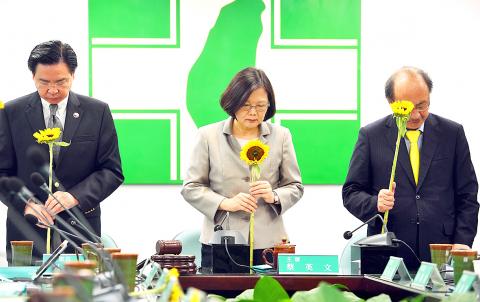
Photo: Lo Pei-der, Taipei Times
Cheng made the remarks following criticism from China’s Taiwan Affairs Office spokesman Ma Xiaoguang (馬曉光), who said Tsai, in a speech at the Center for Strategic and International Studies (CSIS) during her US visit this month, failed to mention the “most important issue at the core” of cross-strait ties.
“Opposing Taiwanese independence and insisting on the [so-called] 1992 consensus are the basis of peaceful developments in cross-strait relations,” Ma told a press conference in Beijing earlier yesterday. “The core value is to agree that mainland China and Taiwan both belong to one China, and cross-strait relations are not nation-to-nation relations.”
“The DPP should clearly define what cross-strait relations are,” he added.
The “1992 consensus” refers to a tacit understanding between the Chinese Nationalist Party (KMT) and the Chinese Communist Party (CCP) that both Taiwan and China acknowledge there is “one China,” with each side having its own interpretation of what “China” means.
In 2006, then-KMT lawmaker Su Chi (蘇起) said that he created the term in 2000, when he was Mainland Affairs Council chairman.
Ma said that the “1992 consensus” should not be narrowly defined as a consensus accepted by the KMT and the CCP, and is not an “abstract concept or a historical term.”
“The term represents the basic attitude of both sides on the one China principle. It is because of this basic attitude that both sides are able to allow for differences while pursuing the same goals, as well as setting aside disputes to commence discussions,” Ma said.
Any changes to the core spirit of the “1992 consensus” removes any valid basis to the peaceful and stable development of cross-strait relations, Ma said, adding that the DPP must clearly respond and define what cross-strait relations are, on what basis such relations are carried out, and how peaceful and stable development should be maintained.
Ma also panned the US government and said its actions were not conducive toward the peaceful and stable development of ties across the strait.
The US should hold to the “one China” policy and their recognition of the principles behind the three communiques, Ma said, adding that “the US should not be sending the wrong signals to Taiwanese independence forces.”
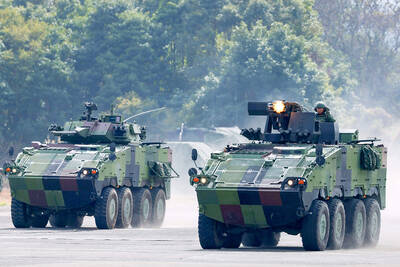
Taiwan must first strengthen its own national defense to deter a potential invasion by China as cross-strait tensions continue to rise, multiple European lawmakers said on Friday. In a media interview in Taipei marking the conclusion of an eight-member European parliamentary delegation’s six-day visit to Taiwan, the lawmakers urged Taipei to remain vigilant and increase defense spending. “All those who claim they want to protect you actually want to conquer you,” Ukrainian lawmaker Serhii Soboliev said when asked what lessons Taiwan could draw from Russia’s invasion of Ukraine. Soboliev described the Kremlin as a “new fascist Nazi regime” that justified
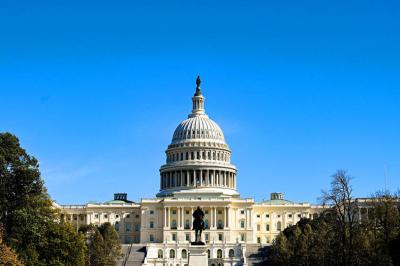
The US House of Representatives yesterday passed the PROTECT Taiwan Act, which stipulates that Washington would exclude China from participating in major global financial organizations if its actions directly threaten Taiwan’s security. The bill, proposed by Republican US Representative Frank Lucas, passed with 395 votes in favor and two against. It stipulates that if China’s actions pose any threat to Taiwan’s security, economic or social systems, the US would, “to the maximum extent practicable,” exclude China from international financial institutions, including the G20, the Bank for International Settlements and the Financial Stability Board. The bill makes it clear that China
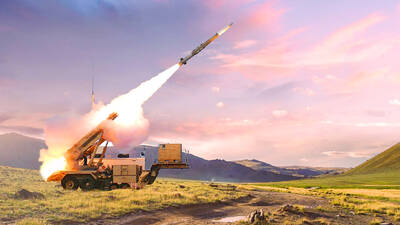
‘T-DOME’: IBCS would increase Taiwan’s defense capabilities, enabling air defense units to use data from any sensor system and cut reaction time, a defense official said A defense official yesterday said that a purported new arms sale the US is assembling for Taiwan likely includes Integrated Battle Command Systems (IBCS). The anonymous official’s comments came hours after the Financial Times (FT) reported that Washington is preparing a US$20 billion arms sale encompassing “Patriot missiles and other weapons,” citing eight sources. The Taiwanese official said the IBCS is an advanced command and control system that would play a key role in President William Lai’s (賴清德) flagship defense program, the “T-Dome,” an integrated air defense network to counter ballistic missiles and other threats. The IBCS would increase Taiwan’s
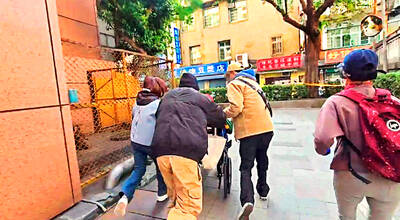
NOMINAL NEWLYWEDS: A man’s family and his wife — his long-term caregiver — are engaged in a legal dogfight over the propriety and validity of the recent union A centenarian’s marriage to his caregiver unbeknownst to his children has prompted legal action, as the caregiver accuses the man’s children of violating her personal liberty and damaging her reputation, while the children have sought a legal option to have the marriage annulled. According to sources, the 102-year-old man surnamed Wang (王) lives in Taipei’s Zhongshan District (中山) and previously worked as a land registration agent. Wang reportedly owns multiple properties and parcels of land worth several hundred million New Taiwan dollars and has ten children. His caregiver, a 69-year-old surnamed Lai (賴), has been caring for him since about 1999,